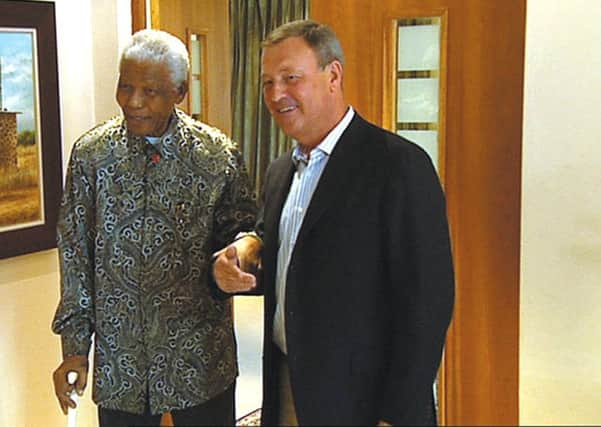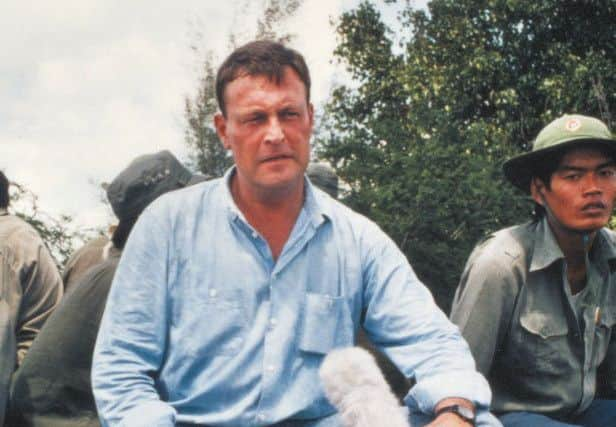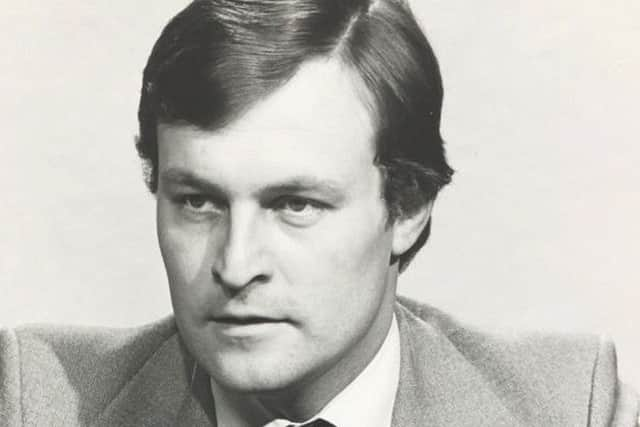Jeremy Thompson - a life making headlines on the frontline of history


It was here in Yorkshire back in the early 1970s amidst a wave of industrial discontent, where a young Jeremy Thompson cut his teeth as a reporter. “I was known jokingly on the picket lines of South Yorkshire as ‘that Southern jessie,’” he says.
It was a rude awakening for someone raised in the more tranquil Home Counties. “I arrived in this extraordinary landscape with its pits and textile mills and looking back I realise that what I was reporting on was the death throes of the Industrial Revolution.
Advertisement
Hide AdAdvertisement
Hide Ad“It was a totally different landscape to the one I’d been brought up in. It was tougher but the people were friendlier. I learned literally at the coal face of journalism on the picket lines and by going to ‘Camelot’ to see Arthur Scargill at the NUM headquarters in Barnsley,” he says.


He worked at BBC Radio Sheffield before moving to Leeds to join Look North as a reporter. “I was working during the three-day week when I had to edit Radio Sheffield by candlelight because all the electricity was out for half the day.”
In the end he spent a decade in Yorkshire before going on to work for ITN and later Sky News. “I married a Yorkshire woman so Yorkshire’s in my soul and very much part of the journalist I ended up becoming. It was by pounding the streets of places like Sheffield, Leeds, Doncaster and Hull that I learned my trade. With a tape recorder in hand I learned how to talk to people, how to get information and to put stories together. It was a huge part of my education as a hack.”
Thompson recounts his time in Yorkshire in his autobiography, Breaking News, which covers his remarkable career stretching back half a century. During that time he’s covered everything from Indira Gandhi’s assassination, the Tiananmen Square massacre and the release of Nelson Mandela, to numerous wars, elections and military coups – and just about everything else in between.
Advertisement
Hide AdAdvertisement
Hide AdHe started as a cub reporter working on the Cambridge Evening News. “I thought if I was any good and got lucky I could make it to Fleet Street but the idea of a broadcast career was not something the likes of me and my generation ever expected.”


Nevertheless, he went from local newspapers to radio and then TV, making his name as a foreign correspondent. “I’ve covered some extraordinary stories and had a bit of fun along the way, but I’m not sure that many journalists now will get the same opportunities to do quite the range and breadth of things that I got to do. I think it was a bit of a golden period.”
In 1984, he was working as a sports reporter covering an England cricket tour in India when Indira Gandhi was assassinated. “I had a visa to go out there so I ended up covering the upheavals in India and then went on to cover the First Test Match in Bombay. On the eve of the first match the British Deputy High Commissioner Percy Norris was assassinated and suddenly I became a crime correspondent.”
He was about to cover the second Test Match in Delhi when thousands of people were killed in Bhopal following a leak from a chemical plant in what was one of the worst industrial disasters in modern history.
Advertisement
Hide AdAdvertisement
Hide Ad“I ended up spending 10 days there with thousands of people dying in the streets. After that I covered the whole election campaign of Rajiv Gandhi getting the first foreign interview with him, so that was quite an eye opener as a roving correspondent.”


Three years later Thompson set up ITN’s Asia bureau, covering Benazir Bhutto’s rise to power in Pakistan, democracy riots in South Korea and the infamous Tiananmen Square massacre in China. “We spent three months with the students there only to see their enthusiasm and excitement about getting democracy crushed by the tanks. You realise that you don’t solve the world’s problems simply by being there.”
His job has taken him to countless hotspots – he covered both Gulf Wars as well as the conflict in the Balkans where he had a narrow escape after being strafed by military jets.
He has met numerous princes and prime ministers but there’s one person who’s impressed him more than any other – Nelson Mandela. “I got to know him very well, he called me by my first name. He was remarkable and certainly the most impressive person I’ve ever met.
Advertisement
Hide AdAdvertisement
Hide Ad“He was an extraordinarily charismatic man who was the right person at the right time to lead his people. At the end of apartheid he persuaded South Africans, including white South Africans, to believe there was another way of doing things. They believed in him and trusted him and he snuffed out the touchpaper of what could have been civil war.


“Yet he was also a man who remembered my name and that of all the other foreign correspondents when he had no reason to, and there aren’t many other politicians around the world who do that.”
If getting to know the man who unified the Rainbow Nation was a great experience, then covering the Rwandan genocide in 1994 when he saw “the worst of humanity,” was a desperate low point.
The life of a foreign correspondent may often seem exciting but it can also be dangerous. “I’ve lost quite a few friends over the years,” he says.
Advertisement
Hide AdAdvertisement
Hide AdIn 2003 he was covering the war in Iraq and he recalls the experience: “I went over the border into southern Iraq as the Allies were going in. I got in through a gap in the fence with my team and a few miles down the road my old mate from ITN Terry Lloyd went over the border – he turned right and I turned left and he got killed later that same day.
“We spent the evening in tears because he was one of our buddies and we had to decide what to do. I asked the team if they wanted to turn back and we all agreed that for Terry’s sake it was our duty to carry on and tell the story.”
He says there are times when you have to take risks and put your neck on the line. “My view is without journalists going out there how do we know what’s going on in the world, and how do you hold people to account unless you go there?
“I count myself fortunate to have been an eyewitness to a lot of the history of our time. It’s a privilege and I’ve always tried to be fair and tell the story straight.”
Advertisement
Hide AdAdvertisement
Hide AdThompson finally called time on his career after last year’s US Presidential election, the sixth that he’s covered. “I wanted to go out with a bang rather a whimper and it turned out to be the most almighty bang that no one expected.”
However, he feels he’s leaving an industry that, like the wider world, is experiencing a period of profound change and uncertainty. “I think journalists are now in the fight of their working lives. I don’t think fake news is anything new, it’s just a variation on the misinformation of propaganda that’s always been out there, but because of social media it is more instantaneous and perhaps more insidious.
“In a split second, false news can immerse large parts of the world and it’s led to confusion among people who don’t know what is the truth and what isn’t.
“I think all of us in the mainstream news have a battle on our hands which is why it’s even more important now that genuine, credible journalists prove their worth and make sure that people get the true story.”
Advertisement
Hide AdAdvertisement
Hide AdBreaking News – An Autobiography is published by Biteback Publishing, is out now, priced £20.
A career of breaking news
Jeremy Thompson is one of this county’s most experienced and acclaimed journalists.
He started as an apprentice journalist joining the Cambridge Evening News in 1967.
He went on to work for Radio Sheffield before switching to become a Look North reporter based in Leeds.
Advertisement
Hide AdAdvertisement
Hide AdThompson then worked for ITV before joining Sky as a foreign correspondent in 1993.
In 1999 he was the first TV journalist to broadcast live as British peacekeeping forces arrived in Kosovo.
His reportage has won numerous accolades including three Emmys, three Baftas and the Royal Television Society’s Presenter of the Year Award.